Meta Faces Dual Crisis as Legal Woes Compound Investor Fears Over AI Spending
23.11.2025 - 10:45:05Meta US30303M1027
Meta Platforms finds itself navigating turbulent waters as legal challenges and financial concerns converge. The social media giant is confronting serious allegations about its internal research practices while simultaneously facing investor skepticism over its massive artificial intelligence expenditures. This dual pressure has triggered significant market value erosion, raising fundamental questions about the company's strategic direction and ethical accountability.
Freshly unsealed court documents from a US class-action lawsuit reveal troubling internal decisions at the Facebook parent company. Central to the case is a 2020 internal study conducted in partnership with Nielsen, internally designated as "Project Mercury."
The research yielded clear conclusions: users who deactivated Facebook and Instagram for one week reported measurable reductions in depression, anxiety, and loneliness. Rather than leveraging these findings for product improvements or conducting follow-up research, Meta allegedly terminated the project. Internal communications suggest company officials dismissed the negative results as merely aligning with "existing media narratives," despite staff acknowledgments of the study's validity.
Financial Markets Express Doubt
These ethical concerns emerge alongside growing investor unease about the company's financial trajectory. Meta shares recently recorded their worst four-day performance since November 2022, erasing a staggering $307 billion in market capitalization. The stock's decline of over 18% on a 30-day basis reflects deepening market skepticism.
Should investors sell immediately? Or is it worth buying Meta?
The primary driver behind this capital flight is the company's ambitious spending plans. Management announced intentions to invest up to $72 billion this year alone in AI infrastructure, with projections of "significantly larger" expenditures by 2026. For many market participants, this aggressive investment strategy evokes uncomfortable parallels to the company's costly Metaverse initiatives, which have yet to demonstrate substantial profitability.
Analyst Concerns Intensify
Financial experts are drawing comparisons to the challenging periods of 2021 and 2022. Tiffany Wade of Columbia Threadneedle Investments characterized the current strategy as a return to "frivolous spending patterns." Similarly, Jason Helfstein at Oppenheimer downgraded the stock, citing enormous investments in "superintelligence" without clear revenue generation pathways.
Market professionals have identified several key concerns:
* Unclear monetization strategy: The path to recouping billions in AI investments remains undefined
* Advertising dependency: Unlike competitors Microsoft or Amazon, Meta lacks substantial enterprise business diversification
* Declining profitability: The company's return on invested capital (ROIC) has already decreased from 32% to 25% quarter-over-quarter
Although Meta currently trades at a price-to-earnings ratio of 19, making it the most affordable among the "Magnificent Seven" stocks, analysts caution investors about a potential "value trap." The combination of legal pressure over allegedly suppressed research and skepticism toward the AI investment strategy continues to weigh heavily on the company's valuation.
Ad
Meta Stock: Buy or Sell?! New Meta Analysis from November 23 delivers the answer:
The latest Meta figures speak for themselves: Urgent action needed for Meta investors. Is it worth buying or should you sell? Find out what to do now in the current free analysis from November 23.
Meta: Buy or sell? Read more here...


